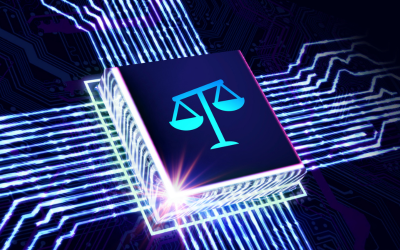You are here
Legal Frontiers: Envisioning law and technology in 2048 (title courtesy of ChatGPT)

In the past 25 years, there have been significant advancements in technology, including the introduction of smartphone, with Apple introducing the iPhone in 2007 and the explosion of mobile applications including banking and shopping. Technology is bringing entertainment into our homes with a proliferation of streaming and downloading services.
We now navigate via Google and Apple maps, we ride share with Uber, and are communicating with the world via social media platforms like Facebook, TikTok, X and instant messaging via WhatsApp and Snap Chat. Technology has infiltrated every aspect of our lives and has changed how we work and how we live, and those changes have implications for law and how we regulate existing and new technologies.
Most people are aware of the November 2022 launch of ChatGPT and how it started the generative AI tools race. So, I thought I would ask ChatGPT for some insights as to where it sees law and technology in 25 years. ChatGPT just like a good lawyer likes to caveat so it pointed out that it involves a lot of speculation, which is probably a fair point considering how much technology change we have seen since 1998. Starting with legal practice its suggests that Artificial Intelligence will “become more deeply integrated into legal practice, assisting with case analysis, and prediction of case outcomes. Advanced AI could draft and review legal documents with minimal oversight.” The use of AI in legal practice is not a new phenome and law firms are looking to harness the benefits of AI. Recently Allen and Overy announced the launch of Harvey, which was developed with Open AI and will assist lawyers with their work. Global law firms have considerable amounts of resource, and it seems likely that over the next 25 years they will want to ensure they leverage the benefits of AI to improve their productivity and efficiency. Working in legal practice is going to be different and there will be a significant amount of change with lawyers working with AI systems. But it is important to recognise that ‘oversight’ is going to remain essential. Lawyers are regulated by professional rules, and have legal responsibilities to their clients, AI might change the way in which lawyers work, but those professional obligations are still going to be paramount.
Next ChatGPT suggested that we would see ‘robot mediators and judges’ it said, “some form of dispute resolution could be handled by AI, particularly low stakes, or small claim contexts. While human judges will still preside over significant cases, AI may provide recommendations or even verdicts in some jurisdictions.” We already have online dispute resolution, some examples include, eBay’s Square Trade, British Columbia has Canada’s first online tribunal and in England and Wales there is Money Claim Online. These platforms encourage the parties to resolve their disputes without attending court. AI tools can already analyse vast quantities of previously decided cases to make case outcomes predictions and look for patterns in the judgments, and there are already examples of AI in the judicial system.1 It is not unreasonable to assume that in 25 years’ time there will be even more sophisticated tools that will predict and could make court decisions, but we must be cognisant of the ethical issues that arise from an increased use of technology. Issues such as transparency- how algorithms are trained and used are critical questions and we must ensure there is accountability and scrutiny otherwise we risk undermining the rule of law.
ChatGPT also highlighted the need for continuing professional development for lawyers and judges to keep up to date with advancements in technology and that law schools should embed technology and digital platforms within their curriculums. Education and training are going to be vitally important in helping us understand and respond to the implications of technology on law. There is an ongoing requirement for all of us to ensure that we are engaging in discussions around the advancements of technology and its relationship with law. There is no doubt that it is hard to predict the future, but if the past 25 years are anything to go by technology is going to keep advancing and law and legal systems are going to have to work very hard to keep up. What is key, is understanding, the choices we are making around technology because that determines the future we will have.

Francine Ryan
Senior Lecturer in Law and Director of the Open Justice Centre.
As the Director of the Open Justice Centre, Francine has worked to develop a range of innovative and technology enhanced opportunities for OU students. Francine created and is now the Director of the Open Justice Online Law Clinic. In this role she has worked with students to pioneer the UK's first 'virtual law clinic. The clinic was highly commended in the 'Best New Pro Bono Project' category athe Attorney General's Pro Bono Awards in December 2018 and won the 'Best Legal Tech' prize in May 2019.